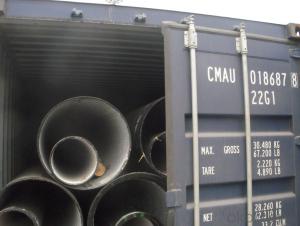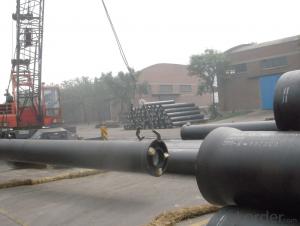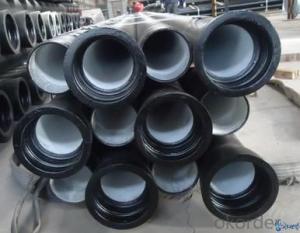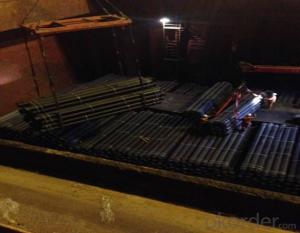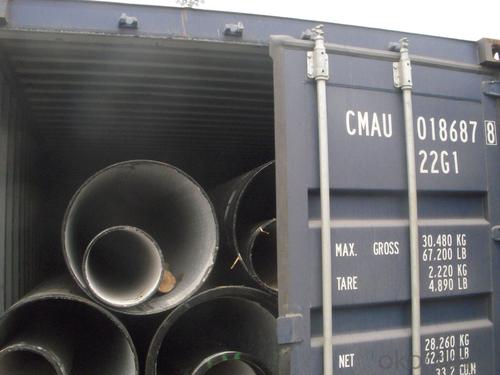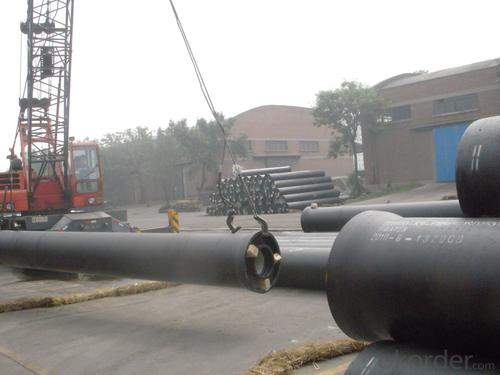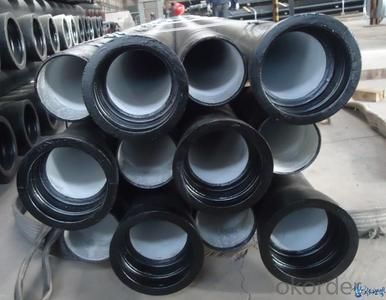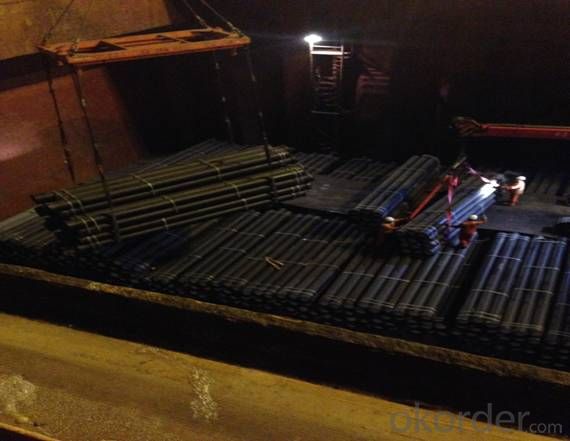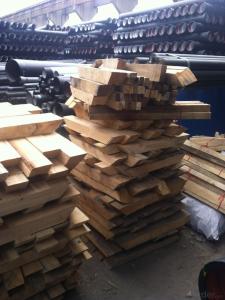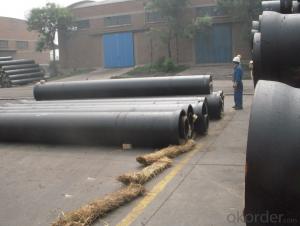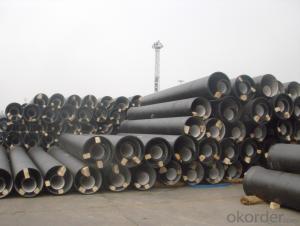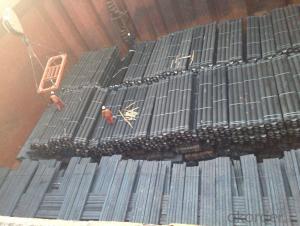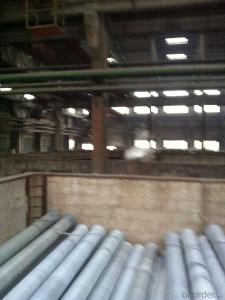DUCTILE IRON PIPES K9 DN100
- Loading Port:
- China Main Port
- Payment Terms:
- TT OR LC
- Min Order Qty:
- -
- Supply Capability:
- -
OKorder Service Pledge
OKorder Financial Service
You Might Also Like
Ductile Iron Cast Pipe is without any defects compare with tradition casting tech, which has many advantages particularly as follow:
(1) High density. In the "vertical upward casting" process, the melt iron of centre liquid column in center crystallizer is continuously feeding for volume shrinkage caused by condensation tube at outer circumference , which lead to be free of shrinkage porosity.
(2) High purity. When melt iron pouring, the mixed impurities such as gas, dross, sand grain which are lighter than melt iron could be eliminated at furnace mouth, its impossible to enter into the crystallizer through the channel, so the melt iron into the crystallizer is very pure.
(3) Strength with toughness. The cooling speed provided by continuous crystallizer is 30 times than sand casting and 5 times than centrifugal casting, and doesn't produce white iron, the eutectic cell volume of continuous cast iron is one eighth to one tenth compare with traditional cast iron. The density of graphite nodule in ductile iron can reach 300-700 pcs/mm2. Therefore, all reason above improve the strength and toughness of continuous cast iron.
(4) Free machining. The high speed cooling make the hardening phase (such as boride, steadite) not appear like reticular, massive or thick, but diffuse like fish bone and pane in shape, moreover, there are tiny graphite flakes inlaid hardening phase. It's free machining in BrinellHardness the range of 250-300HB. However, the Brinell Hardness of 250 is top limit to common metal materials.
(5) Uniform composition of tube wall. The convection mixing of liquid column caused by marching type drawing in crystallizer make the composition of tube wall well-distributed, and concentration gradient very little.
(6) High productivity. To the wall thickness of tube under 10mm, the speed of continuous casting is 1 meter/min, to the wall thickness of tube under 20mm, the speed of continuous casting is 0.5 meter/min, which is high efficiency that centrifugal or other casting tech couldn't reach.
- Q: Are ductile iron pipes suitable for industrial water systems?
- Ductile iron pipes, well-known for their strength, durability, and resistance to corrosion, are a perfect choice for industrial water systems. With the capability to withstand high-pressure and heavy-duty applications, these pipes are ideal for transporting water in large-scale industrial facilities like power plants, factories, and chemical plants. Moreover, ductile iron pipes can handle a broad range of temperatures, making them suitable for both hot and cold water systems. Their inherent flexibility allows for easy installation and maintenance, enhancing their suitability for industrial water systems. In conclusion, ductile iron pipes offer a dependable and economical solution for industrial water transportation requirements.
- Q: Are ductile iron pipes suitable for power plant applications?
- Yes, ductile iron pipes are suitable for power plant applications. Ductile iron is a type of cast iron that has enhanced strength, durability, and flexibility compared to traditional cast iron pipes. These properties make ductile iron pipes ideal for power plant applications where they are exposed to high pressure, extreme temperatures, and corrosive environments. Power plants often require a reliable and robust piping system to transport various fluids such as water, steam, and chemicals. Ductile iron pipes have high tensile strength and can withstand high pressure, ensuring the safe and efficient flow of these fluids within a power plant. Their ability to handle high-pressure steam makes them particularly suitable for power generation applications. Additionally, ductile iron pipes have excellent resistance to corrosion, which is crucial in power plants where many fluids can be highly corrosive. The internal and external linings of these pipes protect them from corrosion, ensuring a longer service life and reducing maintenance costs. This corrosion resistance also makes them suitable for transporting chemicals and wastewater within a power plant. Another benefit of ductile iron pipes is their ability to withstand extreme temperatures. Power plants often operate at high temperatures, and ductile iron pipes can handle these conditions without compromising their structural integrity. They have a high melting point and can resist thermal expansion and contraction, making them suitable for applications involving hot fluids and steam. Furthermore, ductile iron pipes are cost-effective compared to other materials commonly used in power plants, such as stainless steel or carbon steel. They offer a balance between performance and cost, making them an attractive choice for power plant applications. In conclusion, ductile iron pipes are well-suited for power plant applications due to their strength, durability, flexibility, corrosion resistance, and ability to withstand high pressures and extreme temperatures. Their cost-effectiveness further adds to their suitability for power plant piping systems.
- Q: Can ductile iron pipe be used for water supply to remote areas?
- Yes, ductile iron pipe can be used for water supply to remote areas. Ductile iron pipes have excellent strength and durability, making them suitable for long-distance water transmission. They can withstand high pressure and are resistant to external loads and impacts, making them ideal for rugged terrains and remote areas where maintenance and repairs can be challenging. Additionally, ductile iron pipes have a protective lining that prevents corrosion and ensures the water remains safe for consumption. Therefore, ductile iron pipes are an efficient and reliable choice for water supply to remote areas.
- Q: What's the difference between cast iron pipe and steel pipe?
- Steel tube (Steel pipe) production technology development began in the bicycle manufacturing industry, the rise of the early nineteenth Century during the oil development, the two world war ships, boilers, aircraft manufacturing, manufacturing of power boiler after the Second World War, the development of chemical industry of petroleum and natural gas drilling and transportation, will effectively promote the the yield and quality of varieties, the development of steel tube industry.
- Q: Can ductile iron pipe be used for mining applications?
- Certainly, mining applications can make effective use of ductile iron pipe. Ductile iron, a type of cast iron, possesses impressive tensile strength, flexibility, and durability, rendering it well-suited for rugged and demanding environments like mining. Its high strength-to-weight ratio allows for easy handling and installation, making it a cost-effective option for mining operations. Not only are ductile iron pipes resistant to corrosion, but they also exhibit excellent mechanical properties, including high impact and fatigue resistance. These properties make them ideal for the transportation of various materials commonly found in mining, such as water, slurries, and abrasive ores. Additionally, ductile iron pipes boast a lengthy lifespan, ensuring reliable performance and minimal maintenance requirements in mining operations. Moreover, ductile iron pipes endure high pressures and maintain their integrity even under extreme conditions, thus qualifying them for underground mining applications. They can handle the rigorous demands of deep mining operations, including the conveyance of water for cooling or dust suppression, as well as the drainage of wastewater or mine dewatering. On the whole, ductile iron pipes provide the necessary strength, resilience, and corrosion resistance required for mining applications. Their versatility, durability, and ease of installation make them a valuable choice for mining operations, guaranteeing efficient and reliable material transport while reducing downtime and maintenance costs.
- Q: How are ductile iron pipes protected against external soil loads?
- Ductile iron pipes are protected against external soil loads through several methods. One of the primary methods is the use of a protective coating on the exterior surface of the pipe. This coating acts as a barrier between the iron pipe and the surrounding soil, preventing direct contact and reducing the risk of corrosion. Another method of protection is the use of trench backfill materials. The soil used for backfilling is carefully selected and compacted to provide adequate support and load distribution for the pipe. This helps to minimize the stress and pressure exerted on the pipe by the surrounding soil. Additionally, the design and installation of the pipe system play a crucial role in protecting ductile iron pipes against external soil loads. The pipes are typically laid in a properly engineered trench, which includes appropriate bedding and backfilling techniques to ensure stability and minimize the potential for damage. Furthermore, the use of proper pipe jointing techniques is essential for protecting against external soil loads. Joints are often designed to be flexible, allowing for some movement and accommodating external loads. This helps to distribute the stress along the length of the pipe and prevents concentrated pressure points that could lead to failure. Overall, a combination of protective coatings, appropriate backfill materials, proper installation techniques, and joint design contribute to the effective protection of ductile iron pipes against external soil loads. This ensures the longevity and reliability of the pipe system, even in challenging soil conditions.
- Q: The difference between HDPE pipe and ductile iron pipe
- Different installation methods, ductile iron pipes are common flexible sealing ring, slide into the connection; the main drainage pipe is W and B type, clamp connection and mechanical connection, the inner gasket ring.
- Q: How does ductile iron pipe perform in high-velocity flow conditions?
- Ductile iron pipe performs exceptionally well in high-velocity flow conditions. Due to its unique properties, including high tensile strength and impact resistance, ductile iron pipe can withstand the forces exerted by high-velocity flows without experiencing significant damage or failure. One of the key advantages of ductile iron pipe is its ability to resist the effects of water hammer, which is a sudden increase in pressure caused by the rapid deceleration or change in direction of water flow. This is particularly important in high-velocity flow conditions where the velocity of water is significantly higher than normal. Ductile iron pipes are designed to absorb and dissipate the energy generated by water hammer, preventing potential damage to the pipe and the surrounding infrastructure. Additionally, ductile iron pipe has excellent flow characteristics, allowing for smooth and efficient water transport even at high velocities. This is crucial in applications where a large volume of water needs to be transported quickly, such as in industrial processes or fire protection systems. The smooth interior surface of ductile iron pipe minimizes friction and pressure losses, ensuring that the water can flow freely and efficiently, reducing energy consumption and operating costs. Moreover, ductile iron pipe is highly resistant to corrosion, which is a common issue in high-velocity flow conditions where the water may contain aggressive chemicals or particulates. The protective lining and coating systems used in ductile iron pipes provide a barrier against corrosion, extending the lifespan of the pipe and maintaining its structural integrity. In summary, ductile iron pipe is well-suited for high-velocity flow conditions due to its ability to withstand water hammer, its excellent flow characteristics, and its resistance to corrosion. Its strength, durability, and reliable performance make it a preferred choice for various applications, ensuring efficient water transport even in demanding environments.
- Q: Can ductile iron pipe be used for power plant cooling water systems?
- Yes, ductile iron pipe can be used for power plant cooling water systems. Ductile iron pipe is known for its strength, durability, and corrosion resistance, making it a suitable choice for transporting water in power plant cooling systems. Additionally, its ability to withstand high pressure and temperature variations makes it a reliable option for such applications.
- Q: Do ductile iron pipes require external protection against stray electrical currents?
- Yes, ductile iron pipes do require external protection against stray electrical currents. Stray electrical currents can cause corrosion to the pipe, leading to premature failure and potential leaks. To protect against this, external coatings or wraps are applied to the ductile iron pipes to provide a barrier between the pipe and the electrical currents. This protection helps to ensure the longevity and reliability of the pipes, preventing costly repairs and potential safety hazards.
Send your message to us
DUCTILE IRON PIPES K9 DN100
- Loading Port:
- China Main Port
- Payment Terms:
- TT OR LC
- Min Order Qty:
- -
- Supply Capability:
- -
OKorder Service Pledge
OKorder Financial Service
Similar products
Hot products
Hot Searches
Related keywords
